Study In
New Zealand
Study In
New Zealand
New Zealand is located in the Southwest Pacific Ocean and is made up of two main islands, the North Island and the South Island, which are separated by the Cook Strait. The capital of New Zealand is Wellington, but the most popular and vibrant city is Auckland. The country has a total population of approximately five million people, with Auckland alone accounting for 1.7 million residents. This means that nearly one-third of New Zealand’s total population resides in Auckland. The official languages of New Zealand are English and Māori.
Why Study in New Zealand?

Recognized Programmes

Economically Best For Students

79 Different Nationalities
Why Study in New Zealand?
- Universities: There are 8 Government-funded Universities providing undergraduate and postgraduate degree programmes.
- Institutes of Technology and Polytechnics (ITPs): A popular option is to study at one of the 16 government funded Institutes of Technology and Polytechnics. They offer a wide variety of programmes which are both academically and vocationally focused.
- Private Tertiary and Training Establishments: There are a growing number of private tertiary and training providers offering courses in a diverse range of subjects including arts, hospitality, computer studies, secretarial studies, quality management, ecotourism and others.
-
North Island
- The university of Auckland
- Auckland university of technology
- The University of Waikato
- Victoria University of Wellington
- Massey University South Island
- Lincoln University
- Canterbury University <University of Otago
The Education System
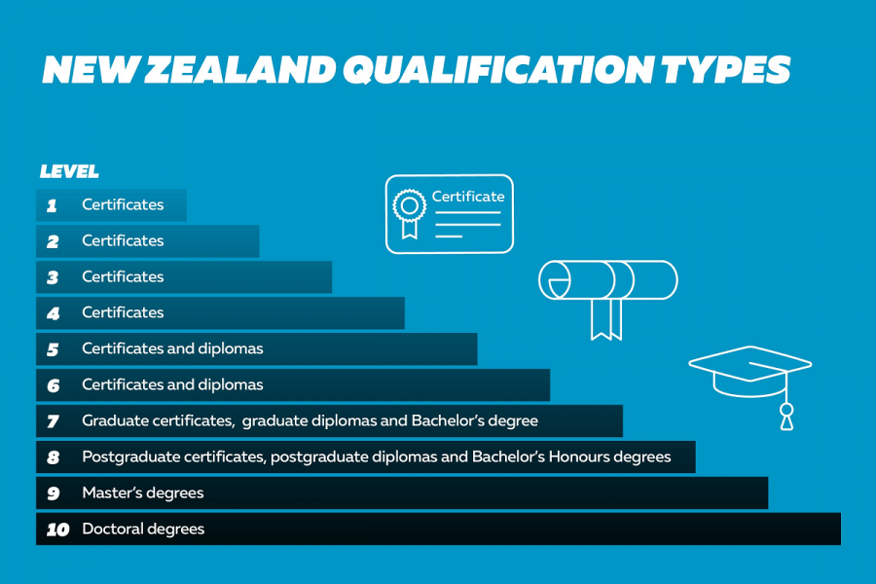
- There are generally two Intakes in New Zealand: February and July.
- However, ITPs and Private Institutes have multiple Intakes for different courses.
- Hence, practically there is an intake every month in some or the other institution resulting in recruitment throughout the year. Deadlines:
- There is no deadline as such in New Zealand, but it is recommended to make applications at least 6 months prior to the start date to avoid last moment hassles.
University Entry Requirements

Entry requirements for ITPs

English Proficiency Requirements
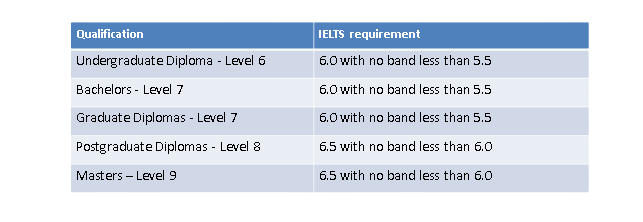
Few Institutions may ask for IELTS 6.5 with no band less than 6.0 for Graduate Diploma Level 7 programmes as well.
- Eligible students can work up to 20 hours in any given week during study time and 40 hours during holidays.
- Students undertaking a course of 12 months or more may work full-time during the holidays.
- The spouse of a student is eligible to work full time for the duration of the study course, only if the student is studying a full-time course of Level 7 or 8 in areas as specified in the Long-Term Skill Shortage List/Green List. However, partners of students on study course of Level 9 and above can work full time without any such condition.
Duration of Post Study Work Visa
Qualification | Post study work visa duration |
|---|---|
Bachelors - Level 7 |
3 Years |
Postgraduate Diplomas - Level 8 |
1 Year |
Masters – Level 9 |
3 Years |
PhD – Level 10 |
3 Years |
Cost of Education
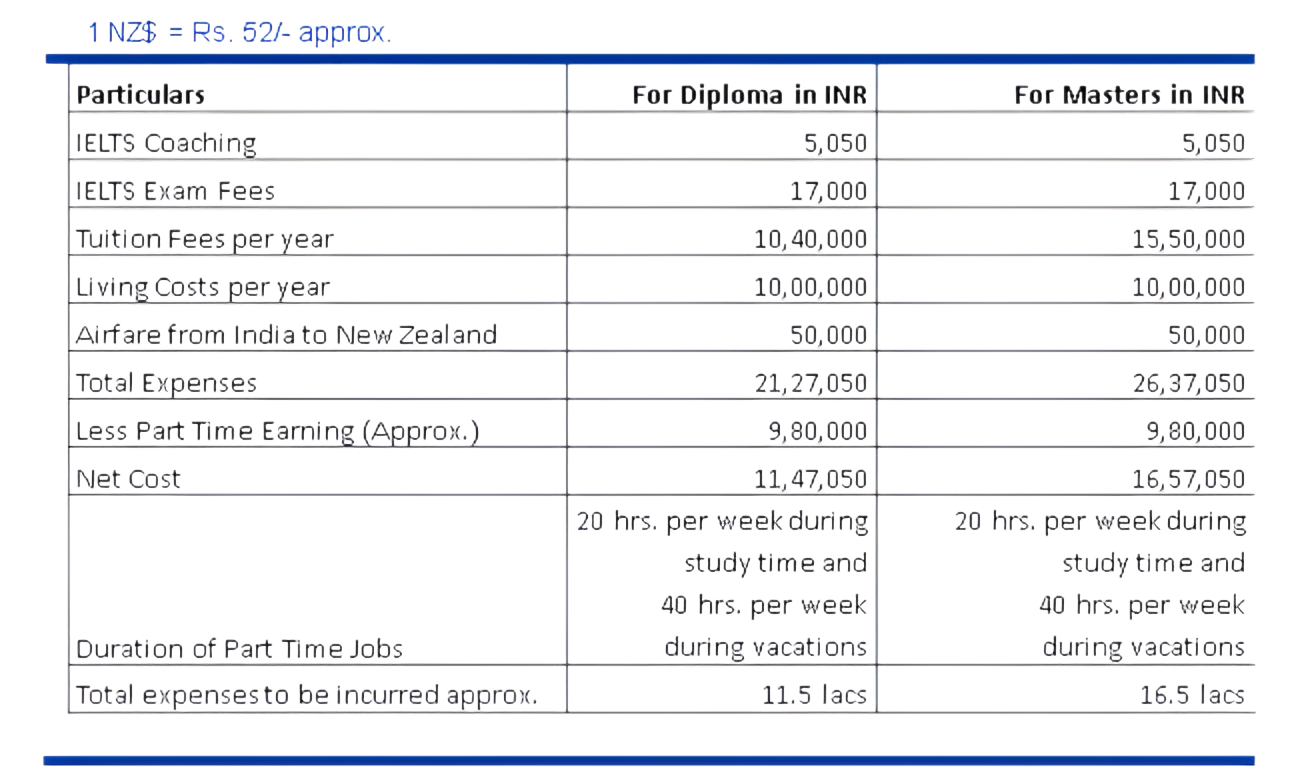
- AUT International Scholarships – South Asia: Up to NZD 7,000 towards tuition fee.
- Vice-Chancellor's Scholarships for International Students: (University of Otago) Up to NZD 10,000 towards tuition fee.
- Victoria Tongarewa Scholarship: NZD 5,000 or 10,000
- Wellington International Excellence Scholarship: NZD 20,000 over three years paid towards tuition fees.
- University of Auckland India High Achievers Scholarship: Up to NZD 20,000 towards tuition fee
- University of Waikato International Excellence Scholarship: Up to NZ$10,000 towards tuition fees.
Average range of fees per annum
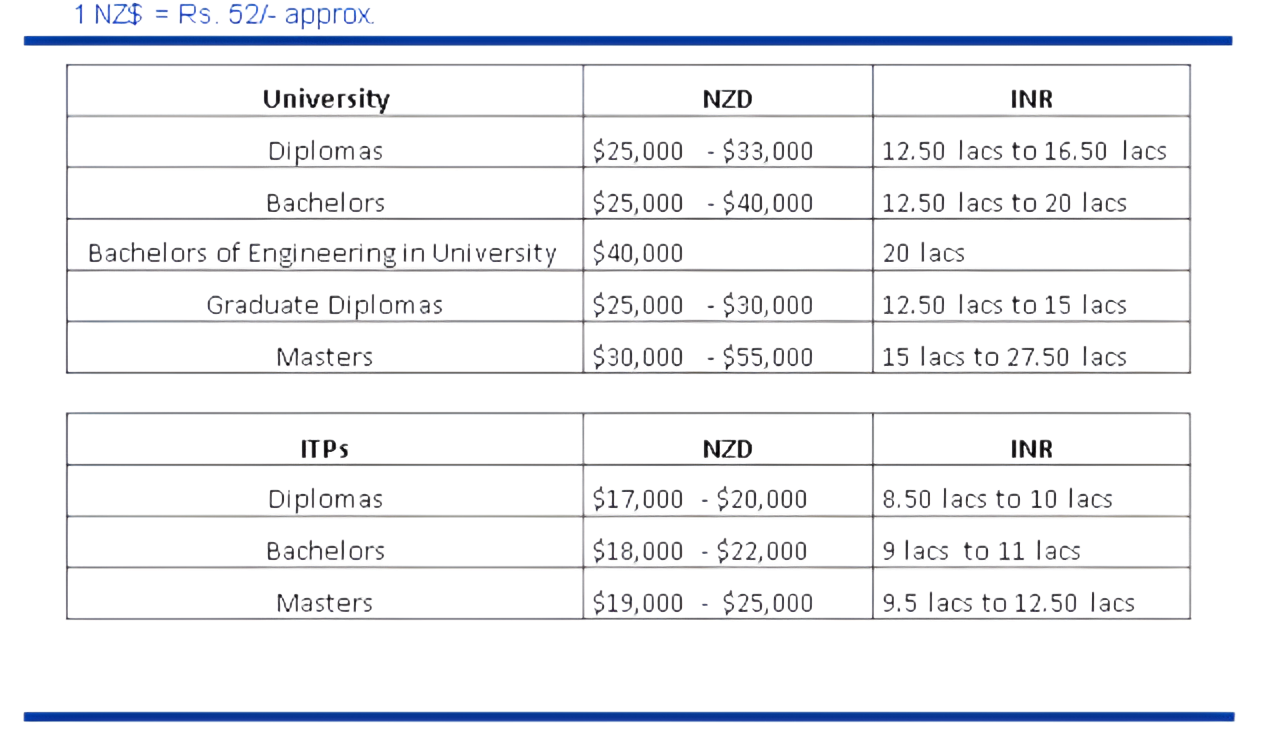
Chart for Comparison of Scores of IELTS/TOEFL iBT/PTE

- Calculate the exact aggregate academic percentage of the last education of the student.
- Check the original academic mark sheets and IELTS score card of the student.
- Check the entry requirements for the particular course from the website of the University/Polytechnic.
- Apply online or by application form as required in the University.
- Upload or send documents to university/college along with the application.
- Signed application form if applicable.
- Resume
- A Statement of purpose (For Masters and PG Diploma only).
- 2 Letters of Recommendation (for Masters and PG Diploma only) and work experience if any.
- IELTS, TOEFL or PTE score card.
- Duly attested degree/provisional/completion certificate and all the marksheets of Bachelors.
- If the 10th or 12th mark sheets contain only the subject codes, subject key should be provided as well.
- Copy of Passport (First and last page).
- Good academic record - 60% and above aggregate in Class 10th and 12th and over 50% aggregate in subsequent tertiary qualification with minimal backlogs, if any
- IELTS score or equivalent score of TOEFL or PTE as per NZQA requirement
- Student’s immediate family’s verifiable evidence of funds to meet the Educational and Living expenses in NZ - including paper trail to explain any recent high value deposits in accounts.
- Single immediate family members as financial sponsors/guarantors (Including Applicant).
- Verifiable evidence of regular source of sufficient income of financial sponsors/guarantors.
- Intended course of study relevant to qualifications and/or work experience which shows logical progression.
- Meet health and character requirements.
- If the course duration is less than or equal to one academic year, then provide documentary evidence of funds for tuition fee for the entire course duration + NZ$ 20,000 towards living expenses in New Zealand.
- If the course duration is longer than one academic year then provide documentary evidence of funds for tuition fee for 1 academic year + NZ$ 20,000 per annum towards living expenses in New Zealand + payment plan to show the student has access to funds and has ability to meet the rest of the course cost and living expenses in New Zealand.
- Completed application forms and supplementary information form.
- VFS Service Fee (Online application) = 860 NZD.
- Original passport.
- Offer of place.
- Covering letter & SOP.
- Financial documents.
- Affidavit of support from sponsor.
- Academic Documents.
- Evidence of English language ability - IELTS/TOEFL/PTE score card.
- Employment documents along with salary statement, if applicable.
- Original police clearance certificate(must be less than 6 months old at the time of visa filing).
- E-Medicals acknowledgement of medical test from empanelled doctor which should not be more than 3 months old.
- Education Loan sanction letter from nationalised or multi nationalised bank.
- Latest bank account statements for the past 3 months. It should not be more than 1 week old at the time of lodgement of application.
- Fixed deposits copy and balance certificate from bank.
- PPF/ PF/ GPF withdrawable amount.
- National saving certificates.
Parents and only immediate relatives (blood relations)
should ideally sponsor the student.
The funds should be at least three months old. If recent funds are to be shown then
documentary evidence in support of every instance of recent deposits should be
provided.
Evidence of source of income of the student’s financial sponsors to be provided.
The sponsors must provide documentary evidence of their identity including date of birth,proof of relationship with student and full contact details including telephone numbers.
- Form 16 of the sponsor showing income and saving patterns.
- EPF or GPF accumulated over a period of 1 year.
- Fixed deposits.
- NSC due for maturity in the following year.
- LIC due for maturity in the following year.
Please note that Immigration New Zealand (INZ) does not accept land documents and/or property valuation as payment plan.
- All supporting documents need to be uploaded in pdf format.
- An acceptable photo is required to be uploaded.
- Application fee is to be paid through credit card only (Visa, MasterCard).
We have identified major reasons for visa refusal of the students.
- Not having sufficient knowledge about the Course/ Institution applied.
- Lack of clarity regarding future plans.
- Discrepancies in work experience letter/details provided by the student and as cross verified by the visa officer during telephonic verification with the employer.
- Funds that could not be verified.
- Not mentioning name of primary agent. To minimize visa refusals, please take care of the following points :-
- Ask the student to go through the contents of the course and website of the institution to get detailed information about the course/institution applied.
- Make the student prepare the answers of various questions which he/she should be aware of and which may be asked by the visa officer during the interview.
- . Ask the student to make his/her future plans i.e. what he/she will be doing after completion of the course (Short term and Long term).
- Verify the work experience of the student at your end before submitting the same to New Zealand Immigration to check the genuineness and authenticity of the same.
- Co-ordinate with the employer to avoid mismatch of the information during cross verification by visa officer.
- Students should co-ordinate with the banks of sponsors to ensure emails or calls made from INZ to verify funds are promptly and appropriately addressed.
Flow Chart for Application & Visa Process
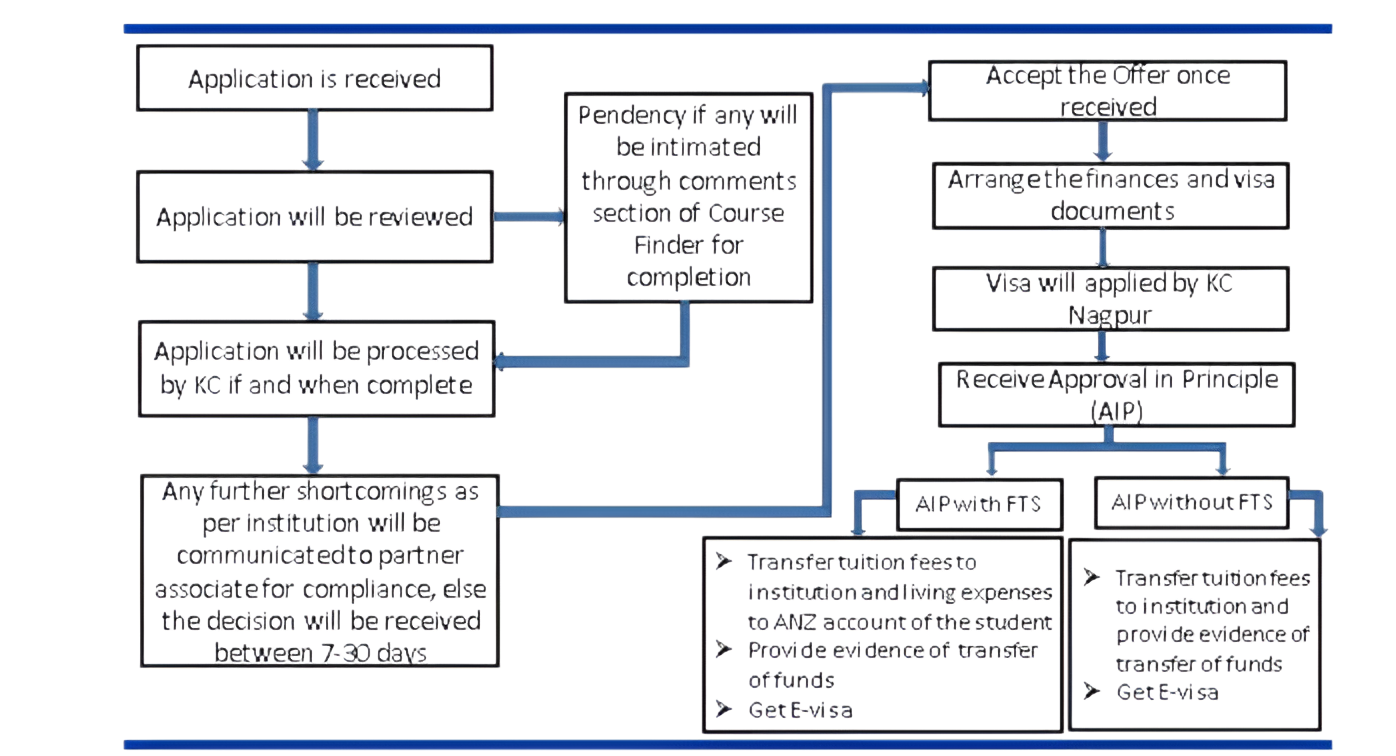
New Delhi: New Zealand High Commission
Sir Edmund Hillary Marg Chanakyapuri
New Delhi 110 021
Chennai: Honorary Consulate for New Zealand
Maithri, 132 Cathedral Road
Chennai 600 086
Student visa applications are processed in New Zealand. The current average processing time is between four to eight weeks depending on the level of verification and assessment required. Hence please encourage students to apply well in time.
Popular areas of study in New Zealand
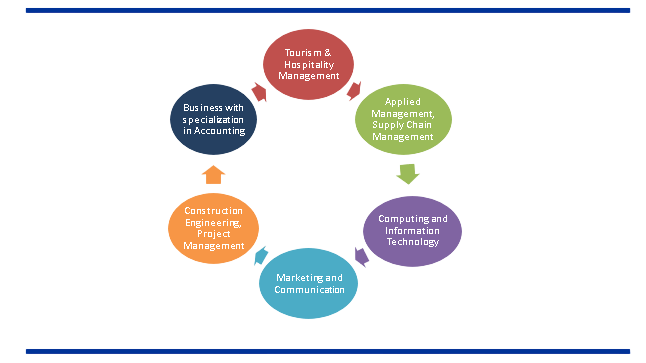
- Lincoln University
- AUT University, New Zealand
- Massey University
- For Bachelors : Students who have completed 12th from IB board may request for an English Proficiency waiver.
- For Masters : English Proficiency waiver is also possible for Masters programs, however it will be completely based on academic profile of the student and the decision is purely at the discretion of the university.
Universities accepting students with Backlogs
Name of University | Baclogs |
|---|---|
University of Auckland |
Up to 15 |
University of Canterbury |
Up to 2 in last 2 years |
Massey University |
Up to 10 |
University of Waikato |
Up to 8 |
Lincoln University |
Up to 10 |
Victoria University of Wellington |
Up to 5 |
Backlogs are generally not a problem in the ITPs in New Zealand, but the overall profile of the student should be good. A good profile means a qualification completed within the standard period with an overall percentage of 60% to 75% in the previous qualification for Bachelors and Masters and likewise 55% to 60% for Undergraduate and Graduate diplomas.
- It is recommended to start applying at least six months before the start date of the course.
- A Graduate Diploma (Level 7) is more of specialised, applied learning coupled with practical knowledge (Industry led) relating to the under graduation field of study already completed by a student. In contrast a Post Graduate Diploma (Level 8) course is more academic learning (Research led).
- Backlogs are not a problem in NZ, but the overall profile of the student should be good. A good profile means a degree completed within the standard period with an overall percentage of 60% to 75% in the previous qualification for Bachelors and Masters and likewise 55% to 60% for Undergraduate and Graduate diplomas.
- Documentary evidence for work experience. Please include salary statements and work experience certificate for all the positions held.
- Parents and only immediate relatives (blood relations) should ideally sponsor the student.
- The funds should be at least three months old.
- If recent funds are to be shown, then documentary evidence in support of every instance of recent deposits should be provided.
- You do not have to show flight tickets and medical insurance as part of funds.
- Less than 1 year
- Tuition fee for entire course.
- NZD 20,000 living expenses.
- More than 1 year
- Tuition fee for 1st year.
- NZD 20,000 living expenses.
- Payment plan for tuition fees for next year and ability to meet living expenses.
- Less than 1 year
- FTS is an option given at the discretion of the visa officer to students whose parents/sponsors do not have funds which are 6 months old. The student will need to transfer at least 12 months living expenses (NZD 20,000) to a bank account in NZ - ANZ Bank, in addition to paying the tuition fee of one year.
- The amount deposited in the bank is locked in a period of 12 months and then drip fed back to the student on a prearranged basis once he/she reaches New Zealand. The student will get NZ $1,667 per month towards living expenses once in NZ.
- Not every student is interviewed. An interview is conducted to get further information about a candidate and it helps INZ to take a decision on the visa application.
- It takes around 4-8 weeks to receive an AIP. If a student receives an interview call, we may expect the decision within 2-3 working days.
- Locate the regional Passport office.
- Apply for PCC.
- Get the original certificate bearing the official seal.
- There are numerous part time jobs available for international students.
- A student can work for 20 hrs per week during study time and up to 40 hrs. per week during holidays.
- The minimum wage rate in New Zealand is $23.15 per hour.
- If the student gets a rejection on grounds that can be rectified, we can make the changes in the visa file and reapply for a positive outcome.
- There is no limitation on the number of times one can apply but the grounds for rejection should be such that there is a possibility for the previous outcome to be overturned with proper rectification.
- If a student has furnished a fraudulent document or lied about a previous visa rejection, we will not entertain the case for reapplication.
